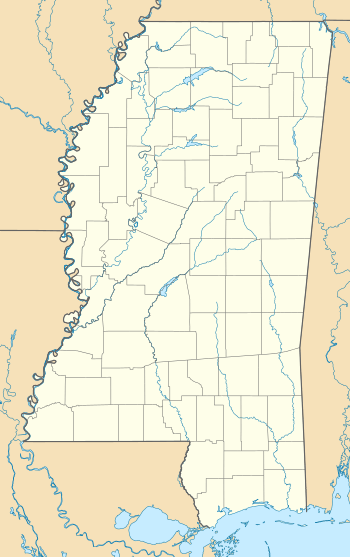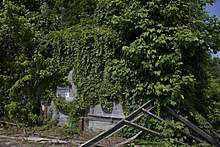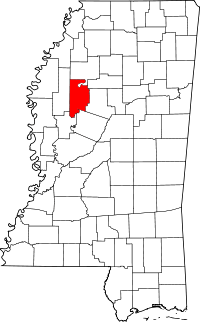Money, Mississippi
Money is an unincorporated Mississippi Delta community near Greenwood in Leflore County, Mississippi, United States.[2] It has fewer than 100 residents, down from 400 in the early 1950s when a cotton mill operated there. Money is located on a railroad line along the Tallahatchie River, a tributary of the Yazoo River in the eastern part of the Mississippi Delta. The community has ZIP code 38945 in the Greenwood, Mississippi micropolitan area.
Money, Mississippi | |
|---|---|
Leflore County Volunteer Fire Department in Money | |
 Money Location in Mississippi  Money Location in the United States | |
| Coordinates: 33°39′04″N 90°12′33″W | |
| Country | United States |
| State | Mississippi |
| County | Leflore |
| Elevation | 138 ft (42 m) |
| Time zone | UTC-6 (Central (CST)) |
| • Summer (DST) | UTC-5 (CDT) |
| GNIS feature ID | 673728[1] |
Money is the site of the 1955 lynching of 14-year-old Emmett Till by white men, an event that gained nationwide attention. The suspects were acquitted by an all-white jury in 1955. They sold their story to Look magazine the next year and admitted their crime in the 1956 interview.
History
This rural area was developed for cotton cultivation. The Money post office was established in 1901.[3] The community was named for Hernando Money, a United States Senator from Mississippi.[4]
Murder of Emmett Till

Money became infamous for the lynching of Emmett Till, a 14-year-old African-American boy from Chicago, who was visiting his uncle Moses Wright in August 1955. Till was accused of flirting with Carolyn Bryant, a white woman working alone at Bryant's Grocery which she owned with her husband Roy Bryant. In 2007 Bryant revealed that she had fabricated details of the encounter in her testimony at trial.[6]
After the store encounter, Roy Bryant and his half-brother, J.W. Milam, abducted, tortured, and murdered Till because Carolyn Bryant said that Till had flirted with her, crossing the "color line". The pair were arrested and tried for the murder, but were acquitted by an all-white jury. Several months later, they sold their story, and confessed to the killing in an interview with William Bradford Huie that was published in the January 1956 issue of Look magazine.
Till's mother, Mamie Till Bradley, insisted on an open casket funeral for her son in Chicago. She wanted people to see that her son had been badly beaten before his death. She allowed news photographs of his body to be published. National awareness was heightened of lynching in the South and the oppression and violence against blacks under Jim Crow. Historians suggest that the Emmett Till murder helped galvanize the civil rights movement by drawing national attention to injustices in the South.
Legacy
A historical marker is at the site of the former Bryant's Grocery Store, as part of the Mississippi Freedom Trail. It notes the influence of Till's murder and the injustice of his killers going free as catalysts for the civil rights movement both nationally and statewide.
In popular culture
A wooden bridge across the Tallahatchie River at Money was the focus of Bobbie Gentry's 1967 hit song "Ode to Billie Joe." The November 10, 1967 issue of Life magazine featured a photo of Gentry crossing the bridge. The bridge collapsed in June 1972 after being burned by vandals.[7] It has since been replaced.
Notable people
- Richard "Hacksaw" Harney – Delta blues guitarist and pianist[8]
- James Schaffer – religious leader and centenarian.
- Willye White – Olympic athlete.[9]
Gallery
- Former Money post office
 Mississippi Freedom Trail Marker
Mississippi Freedom Trail Marker
References
- "Money". Geographic Names Information System. United States Geological Survey.
- "Money, Mississippi". Geographic Names Information System. United States Geological Survey.
- "Leflore County". Jim Forte Postal History. Retrieved 1 November 2015.
- Gallant, Frank K. (16 February 2012). A Place Called Peculiar: Stories about Unusual American Place-Names. Courier Corporation. p. 95. ISBN 978-0-486-48360-3.
- "Emmett Till's Legacy 50 Years Later." Jet. Johnson Publishing Company. September 19, 2005. Vol. 108, No. 12. ISSN 0021-5996. Retrieved from Google Books on July 4, 2010.
- "Woman Linked to 1955 Emmett Till Murder Tells Historian Her Claims Were False". Retrieved 2018-08-07.
- Tobler, John (1992). NME Rock 'N' Roll Years (1st ed.). London: Reed International Books Ltd. p. 239. CN 5585.
- Komara, Edward; Lee, Peter (July 19, 2004). "The Blues Encyclopedia". Routledge. p. 409 – via Google Books.
- Wiggins, David K. (26 March 2015). African Americans in Sports. Routledge. p. 401. ISBN 978-1-317-47744-0.
